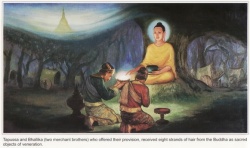Difference between revisions of "Virtue Victorious"
(Created page with "thumb|250px| <poem> '''Virtue Victorious''' [徳勝童子] (Jpn Tokusho-doji) A boy who is said to have offered a mud pie to Shakyamuni Buddha. Ac...") |
|||
| Line 1: | Line 1: | ||
[[File:Buddha-24a.jpg|thumb|250px|]] | [[File:Buddha-24a.jpg|thumb|250px|]] | ||
<poem> | <poem> | ||
| − | '''Virtue Victorious''' | + | '''[[Virtue]] Victorious''' |
[徳勝童子] (Jpn Tokusho-doji) | [徳勝童子] (Jpn Tokusho-doji) | ||
| − | A boy who is said to have offered a mud pie to Shakyamuni Buddha. According to The Story of King Ashoka, a work translated into Chinese by An Fa-ch'in in the early fourth century, one day when the Buddha was begging for alms in Rajagriha, he came upon two boys, Virtue Victorious and Invincible, while they were playing. The two boys wished to present an offering to the Buddha but had nothing to give, so Virtue Victorious hastily fashioned a mud pie and placed it in the Buddha's begging bowl, while Invincible pressed his palms together in reverence. Because of the blessings from this offering, a hundred years after the Buddha's death, Virtue Victorious was reborn as King Ashoka and Invincible as his consort. In the King Ashoka Sutra, translated by Samghavarman in 512, the boy Virtue Victorious appears with the Sanskrit name Jaya (Victorious), and the boy Invincible, with the name Vijaya, also meaning victorious. | + | A boy who is said to have [[offered]] a mud pie to [[Shakyamuni Buddha]]. According to The Story of [[King]] [[Ashoka]], a work translated into {{Wiki|Chinese}} by An Fa-ch'in in the early fourth century, one day when the [[Buddha]] was begging for [[alms]] in [[Rajagriha]], he came upon two boys, [[Virtue]] Victorious and [[Invincible]], while they were playing. The two boys wished to present an [[offering]] to the [[Buddha]] but had [[nothing]] to give, so [[Virtue]] Victorious hastily fashioned a mud pie and placed it in the [[Buddha's begging bowl]], while [[Invincible]] pressed his palms together in reverence. Because of the [[blessings]] from this [[offering]], a hundred years after the [[Buddha's]] [[death]], [[Virtue]] Victorious was [[reborn]] as [[King]] [[Ashoka]] and [[Invincible]] as his [[consort]]. In the [[King]] [[Ashoka]] [[Sutra]], translated by Samghavarman in 512, the boy [[Virtue]] Victorious appears with the [[Sanskrit]] name Jaya (Victorious), and the boy [[Invincible]], with the name [[Vijaya]], also meaning victorious. |
</poem> | </poem> | ||
{{R}} | {{R}} | ||
Latest revision as of 01:49, 4 September 2013
Virtue Victorious
[徳勝童子] (Jpn Tokusho-doji)
A boy who is said to have offered a mud pie to Shakyamuni Buddha. According to The Story of King Ashoka, a work translated into Chinese by An Fa-ch'in in the early fourth century, one day when the Buddha was begging for alms in Rajagriha, he came upon two boys, Virtue Victorious and Invincible, while they were playing. The two boys wished to present an offering to the Buddha but had nothing to give, so Virtue Victorious hastily fashioned a mud pie and placed it in the Buddha's begging bowl, while Invincible pressed his palms together in reverence. Because of the blessings from this offering, a hundred years after the Buddha's death, Virtue Victorious was reborn as King Ashoka and Invincible as his consort. In the King Ashoka Sutra, translated by Samghavarman in 512, the boy Virtue Victorious appears with the Sanskrit name Jaya (Victorious), and the boy Invincible, with the name Vijaya, also meaning victorious.
